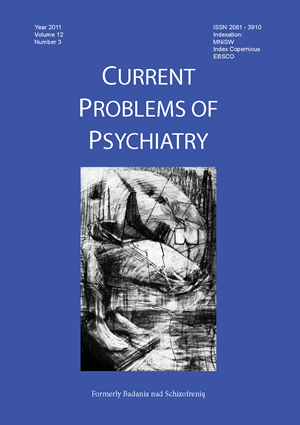Zespół gwałtownego objadania się – stan wiedzy
Słowa kluczowe:
zaburzenia odżywiania, zespół gwałtownego objadania się, terapia poznawczo-behawioralnaAbstrakt
Pomimo tego, że w ostatnich 30 latach zespół gwałtownego objadania się zyskał sporo uwagi w środowisku medycznym, wciąż jest pewną zagadką i wyzwaniem dla klinicystów. Zespół ten charakteryzuje się występowaniem epizodów napadowego objadania się, podczas których osoba traci kontrolę nad procesem jedzenia. Po takich epizodach nie występują objawy kompensacyjne, służące pozbyciu się przyjętego pokarmu. Zespół jest poważnym zaburzeniem, mogącym wpływać negatywnie na zdrowie somatyczne oraz na funkcjonowanie psychospołeczne. Może wiązać się z nadwagą i otyłością, zaburzeniami nastroju i zaburzeniami lękowymi oraz uzależnieniami. Współwystępuje również z zaburzeniami osobowości. Jest powszechny w populacji ogólnej (co najmniej 3%), a jeszcze częściej występuje u osób mających problemy z nadwagą (od 7% do 12%). Istnieje kilka teorii i prób wyjaśnienia przyczyn i czynników ryzyka tego zespołu, jednak jego etiologia pozostaje wciąż niejasna.
Bibliografia
1. American Psychiatric Association. Kryteria diagnostyczne według DSM-IV-TR, Wyd. 1; Wrocław: Elsevier Urban & Partner; 2008.
2. Brody M.L., Walsh B.T., Devlin M.J. Binge eating disorder: Reliability and validity of a new diagnostic category. J. Consult. Clin. Psychol., 1994; 62: 381–386.
3. American Psychiatric Association DSM 5 Development http://www.dsm5.org/ProposedRevision/Pages/FeedingandEatingDisorders.aspx (odczyt z dn. 29.05.2011)
4. Wonderlich S.A., Gordon K.H., Mitchell J.E., Crosby R.D., Engel S.C. The validity and clinical utility of binge eating disorder. Int. J. Eat. Disord., 2009; 42: 687–705.
5. Grucza R.A., Przybeck T.R., Cloninger C.R. Prevalence and correlates of binge eating disorder in a community sample. Comp. Psychiatr., 2007; 48: 124–131.
6. Hudson J.I., Hiripi E., Pope Jr H.G., Kessler R.C. The prevalence and correlates of eating disorders in the National Comorbidity Survey Replication. Biol. Psychiatry, 2007; 61: 348–358.
7. Ricca V., Mannucci E., Moretti S., et al. Screening for binge eating disorder in obese outpatients. Comp. Psychiatry., 2000; 41:111–115.
8. Didie E.R., Fitzgibbon M. Binge eating and psychological distress: Is the degree of obesity a factor? Eating Behaviors., 2005; 6: 35–41. 9. Javaras K.N., Laird N.M., Reichborn-Kjennerud T., Bulik C.M., Pope H.G. Jr, Hudson J.I. Familiality and heritability of binge eating disorder: results of a case-control family study and a twin study. Int. J. Eat. Disord., 2008; 41: 174–179.
10. Bulik C.M., Tozzi F. Genetics in eating disorders: state of the science. CNS Spectr., 2004; 9: 511–515.
11. Striegel-Moore R.H., Dohm F.A., Kraemer H.C., et al. Risk factors for binge-eating disorders: an exploratory study. Int. J. Eat. Disord., 2007; 40: 481–487.
12. Grilo C,M,, Masheb R,M. Childhood psychological, physical, and sexual maltreatment in outpatients with binge eating disorder: Frequency and associations with gender, obesity, and eating-related psychopathology. Obes. Res., 2001; 9: 320–325.
13. Stice E. Risk and maintenance factors for eating pathology: a meta-analytic review. Psychol. Bull.,2002;128: 825–848.
14. Field A.E., et al. Family, peer, and media predictors of becoming eating disordered. Arch. Pediatr. Adolesc. Med., 2008; 162(6): 574-579.
15. Mitchell J.E., Mussell M.P. Comorbidity and binge eating disorder. Addict. Behav., 1996; 20: 725–732.
16. Striegel-Moore R.H., et al. Risk factors for binge-eating disorders: An exploratory study. Int. J. Eat. Disord., 2007; 40: 481–487.
17. Nu´n˜ez-Navarro A., et al. Differentiating purging and nonpurging bulimia nervosa and binge eating disorder. Int. J. Eat. Disord., 2010; 24 Sept: DOI:10.1002/eat. 20823.
18. Davis C. Personality and eating behaviors: A case–control study of binge eating disorder. Int. J. Eat. Disord., 2008; 41: 243-250.
19. Dunkley D.M., Grilo C.M. Self-criticism, low self-esteem, depressive symptoms, and over-evaluation of shape and weight in binge eating disorder patients. Behav. Res. Ther., 2007; 45:139–149.
20. Appolinario C., Bacaltchuk J., Sichieri R., et al. A randomized, double-blind, placebo-controlled study of sibutramine in the treatment of binge eating disorder. Arch. Gen. Psychiatr., 2003; 60: 1109–1116.
21. McElroy S.L., Hudson J.I., Capece J.A., et al. Topiramate for the treatment of binge eating disorder associated with obesity: a placebo-controlled study. Biol. Psychiatr., 2007; 61: 1039–1048.
22. Fairburn C., Harrison P.J. Eating disorders. Lancet., 2003; 361: 407–416.
23. Dale-Grave R. Eating disorders: progresses and challenges. Eur. J. Intern. Med., 2011; 22: 153–160.
24. Brownley K.A., Berkman N.D., Sedway J.A., Lohr K.N., Bulik C.M. Binge eating disorder treatment: a systematic review of randomized controlled trials. Int. J. Eat.Disord. 2007; 40 :337–348.
25. Wilson G.T., et al. Psychological treatments of binge eating disorder. Arch. Gen. Psychiatry., 2010; 67:94–101.
26. Munsch S., Biedert E., Meyer A., et al. A randomized comparison of cognitive behavioral therapy and behavioral weight loss treatment for overweight individuals with binge eating disorder. Int. J. Eat. Disord., 2007; 40: 102–113.
27. Kristeller J.L., Woleverb R.Q. Mindfulness-based eating awareness training for treating binge eating disorder: The Conceptual Foundation. Eat. Disord., 2011; 19: 49–61.
Pobrania
Opublikowane
Numer
Dział
Licencja
Prawa autorskie (c) 2011 Autorzy

Praca jest udostępniana na licencji Creative Commons Attribution-NonCommercial-NoDerivatives 3.0 Unported License.


